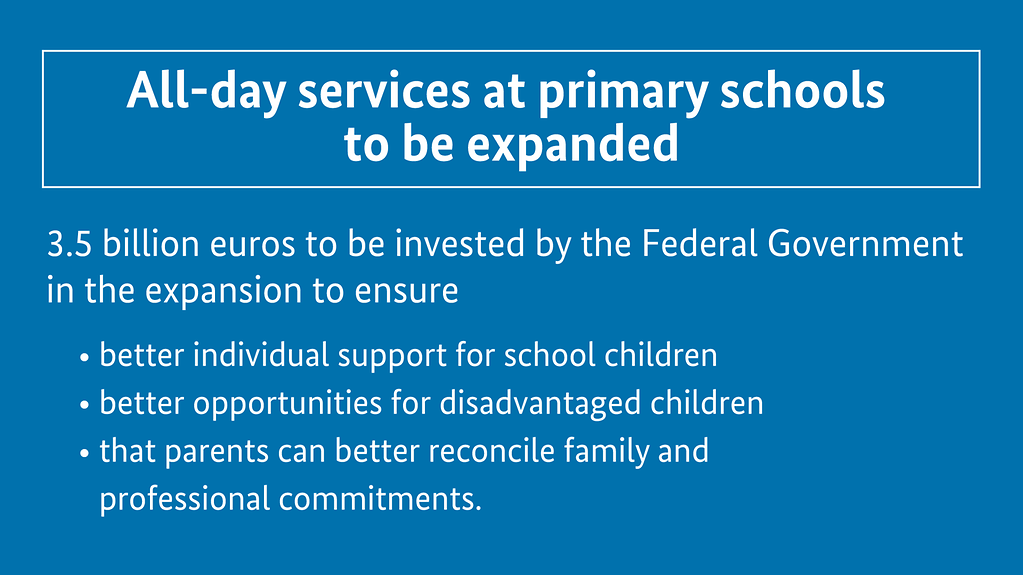Questions and answers
The Federal Government is driving forward the expansion of all-day care in primary schools. As of the academic year 2026/2027, legal entitlement to all-day care is to be introduced on a step-by-step basis for all primary school children. After the Mediation Committee agreed on a compromise, the Bundestag and Bundesrat have now given their final approval to the project.
4 min reading time

More quality daycare options are needed for primary school children in the afternoon, too.
The chart shows the heading on a blue background: “All-day care services at primary schools to be expanded”. Underneath it says: The Federal Government is investing 3.5 billion euros in this expansion, thereby ensuring enhanced individual support for schoolchildren, better opportunities for disadvantaged children and improved compatibility of family and work.
Photo: Federal Government
What exactly is the Federal Government planning in the area of all-day care?
The Federal Government has initiated legal entitlement to all-day care for primary children as of 2026. This translates into practice an important project set out in the coalition agreement.
The Bundesrat referred the project to the Mediation Committee because the Länder did not agree to the planned financing of childcare places. After the Mediation Committee found a compromise, the Bundestag and Bundesrat have now finally approved the scheme.
This means that legal entitlement to all-day care will come into force as of 1 August 2026 as planned. It will initially apply to primary school children in first grade and will then be extended to the grade levels successively on a year-by-year basis. This means that as of 1 August 2029, every primary school child in grades one to four will be legally entitled to all-day care. This includes support for eight hours a day, five days a week. Lesson time will count towards this entitlement. There is of course no obligation to make use of this scheme.
How will the expansion of all-day care be financed?
All in all, the Federal Government is providing a sum of up to 3.5 billion euros to the Länder to enable them to expand all-day care at primary schools.
Since the Länder did not initially agree to the planned financing of childcare places, the Bundesrat referred the matter to the Mediation Committee. Among other things, the compromise arrived at between the Bundestag and Bundesrat in the Mediation Committee now provides for federal financial assistance to be granted for the maintenance of existing childcare places and not only for the creation of new places.
In addition, the Federal Government will cover up to 70 percent of the investment costs. Originally, a 50 percent share was envisaged here. Moreover, the Federal Government is to shoulder some of the additional running costs incurred by the Länder: from 2026 onwards, the Federal Government will gradually increase its contribution to running costs – totalling up to 1.3 billion euros per year as of 2030. A sum of just under one billion euros had initially been planned.
There are also new plans to review the costs in 2027 and 2030 so as to adjust funding as necessary.
How great is the demand for all-day care in Germany?
About half of primary school children already make use of all-day care services. However, Federal Minister for Family Affairs Franziska Giffey believes demand is substantially higher, estimating it to be between 75 and 80 percent. This gap is now to be closed. The coronavirus pandemic threw into sharp relief the importance of childcare services being provided in the afternoon, too. The aim of the Federal Government’s commitment to all-day care services is to make it easier for parents to reconcile work and family commitments.
Why is all-day care important?
The expansion of all-day care at primary school level is important to the Federal Government. Daycare services outside actual teaching time not only make it easier for parents to balance work and family commitments. Primary school children also benefit from a reliable all-day care system in that it helps foster their social, emotional and physical development. What is more, schoolchildren can receive individual support outside lessons. This helps improve opportunities for children from socially disadvantaged families.
Why is the Federal Government doing so much in the field of child daycare?
For many years, the Federal Government has been committed to ensuring an efficient and effective system of daycare for children. The coronavirus pandemic in particular has demonstrated clearly how crucial it is to invest in reliable daycare.
In 2007, the Federal and Länder Governments agreed to increase the number of daycare places available to the under threes and introduce legal entitlement to early years provision for this age group as of 2013. Since then, several investment programmes have been launched to finance daycare for children. Between 2008 and 2020 the Federal Government invested some 4.4 billion euros in expanding early years provision, creating and securing more than 780,000 new places – and this expansion is not yet complete.
However, the transition from nursery-level daycare to primary school is still a challenge for many families, since the demand for all-day care services among primary-age children cannot yet be met. When children reach school age, they are currently no longer entitled to a place in daycare, even though the school day often ends at lunchtime. This is why more quality daycare options are needed for primary school children in the afternoon, too.